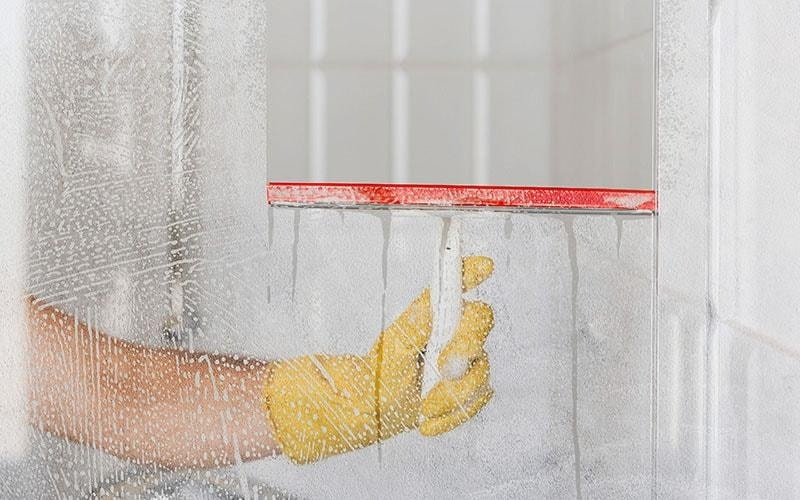Cleaning glass shower doors is a tough task without that harsh vinegar smell. Yet, every glass cleaning guide suggests you use vinegar mixed with lemon juice or soap. The good news is you don’t need to use vinegar to get sparkling shower doors.
In this article, we’ll cover five effective ways to clean glass shower doors using gentle, everyday ingredients. No vinegar required.
The Science Behind Dirty Glass Shower Doors
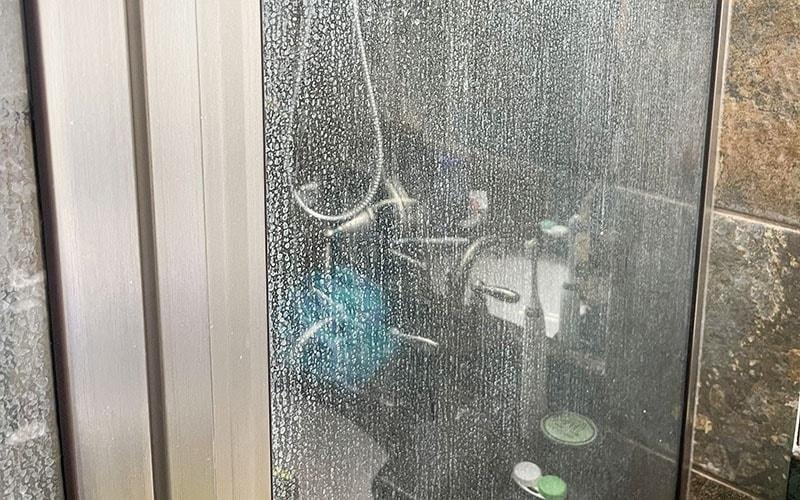
Shower doors are regularly exposed to water and soap. Water contains dissolved minerals (calcium and magnesium). Hard water contains a high concentration of these minerals.
With each water splash, a small amount of minerals is etched onto the glass surface. This results in cloud water stains that are deeply embedded in the glass. Soap mixes with the water minerals to make soap scum, a white chalky substance.
As these compounds are embedded into the shower glass, no amount of scrubbing or washing will remove these stains.
Why Does Everyone Tell You to Use Vinegar?
The answer is “acid”. Vinegar is a strong acid (acetic acid) with a pH level between 2 and 3. Acids react with the water minerals and lift them from the glass surface. Vinegar is highly recommended because it’s affordable, stores well, and most households have it on hand.
Here are six alternatives to vinegar for all your cleaning applications.
- Lemon/Lime Juice: It contains citric acid and has a pH between 2 and 3.
- Hydrogen Peroxide: A weak acid with a pH between 3 and 6.
- Oxalic Acid: A strong acid with a pH between 1.25 and 4.
- Apple Cider Vinegar: Same 2-3 pH level but with a more pleasant apple smell.
- Baking Soda: An alkaline (opposite of acid) with a pH of 9.
- Borax: A natural cleaner with a pH of 9.2-9.5.
An alkaline cleaner will not help with the water stains. However, it will get rid of grease and oil buildup.
Pre-Cleaning Steps
This article has five different techniques for cleaning glass shower doors. Before you start, follow these preparatory steps irrespective.
- Always rinse your glass shower doors with warm water. Let all the loose dirt and hair wash away before you begin. This increases the effectiveness of your cleaning agents.
- Remember to clean the shower door tracks, rubber stoppers, and handles along with the glass doors. Moisture gets trapped in those tracks, which results in rusting, grout buildup, mold, mildew, and bacterial growth.
- Always make sure your bathroom windows are open and the exhaust fan is on. Many of these cleaning agents release fumes that can cause headaches and respiratory issues.
Level 1: Natural Lemon & Citrus Cleaning
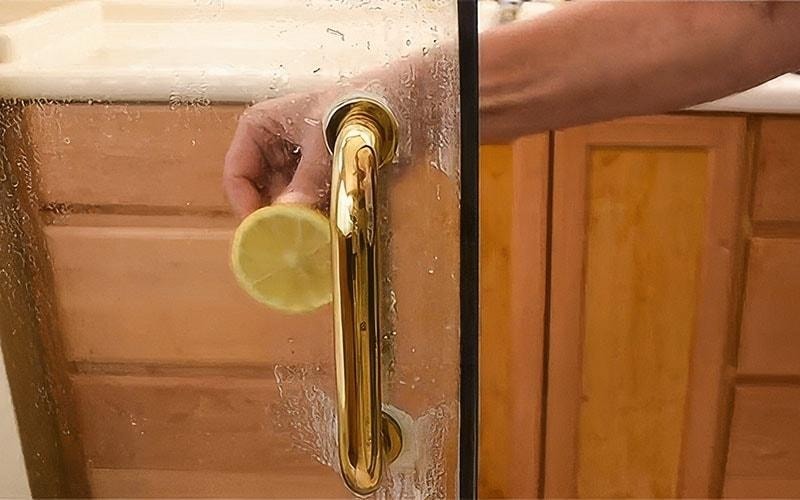
Level 1 is a weekly cleaning schedule. Ideal for barely dirty glass shower doors, where the water stains are barely visible.
Materials Needed
This method uses the citric acid from lemons to break down the mineral deposits. You can substitute the lemon with a weak acid like hydrogen peroxide or a strong acid like oxalic acid.
- 2-3 Lemons or Limes
- Soft Sponge
- Microfiber Towel
Cleaning Steps
- Cut your lemons or limes into halves. Gently scrub the shower glass with the lemon.
- Let the lemon juice sit for 5-10 minutes and break down the mineral deposits.
- Use a soft sponge soaked in warm water to remove the lemon residue from the glass door.
- Wipe the glass shower doors with a clean microfiber towel. Microfiber towels ensure maximum water absorption, zero lint risk, and a streak-free finish.
Heat also helps with stain removal, so use warm water whenever possible. You can also use a squeegee or a disposable paper towel to remove the soap suds after scrubbing. It’s a more water-efficient cleaning technique.
Level 2: Scrubbing with Baking Soda
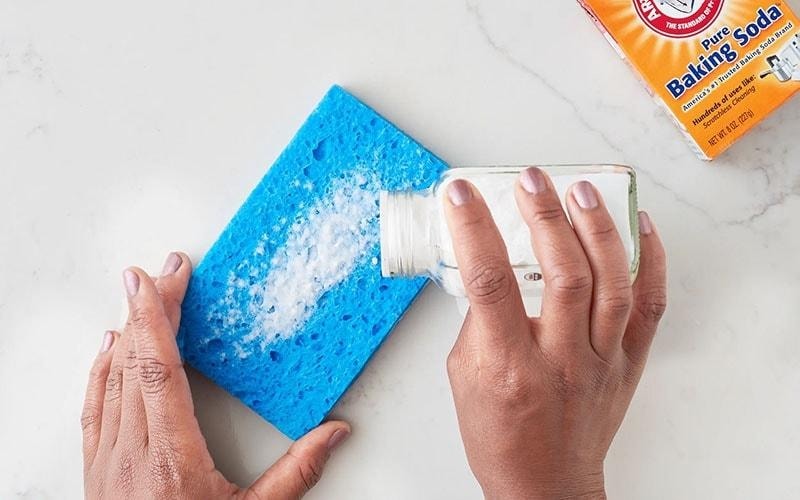
Use this to clean after 1-3 months when the water stains start to become noticeable.
Materials Needed
- Baking Soda
- Scrubbing Sponge
- Microfiber Towel
Cleaning Steps
- Mix baking soda with water until you get a soft paste-like consistency.
- Thoroughly scrub the glass shower door and handle with the baking soda paste.
- Wait 15 minutes, then rinse the shower door with clean water.
- Dry the doors with a clean microfiber towel.
You may have read that baking soda needs to sit overnight to maximize stain removal. However, we strongly recommend against it. Baking soda, distilled white vinegar, and other cleaning chemicals are slightly corrosive. Wait too long and you risk permanent damage to your copper and aluminum.
Level 3: Lemon & Baking Soda Combo
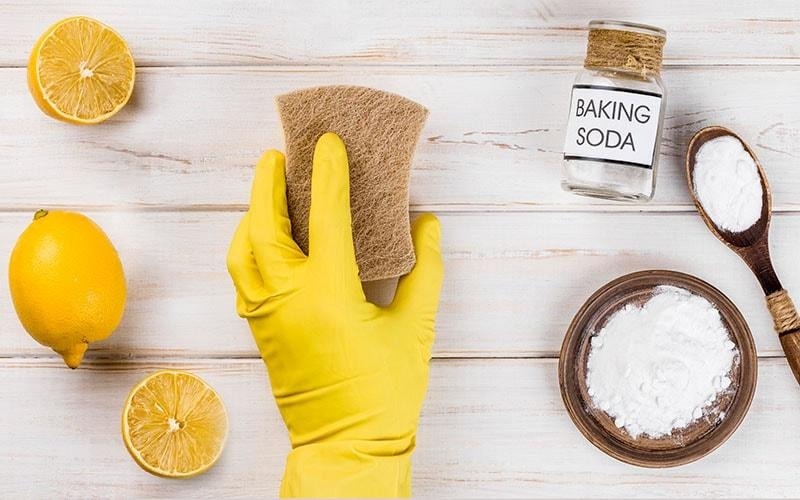
Level 3 is for 3-6 months of soap scum buildup, when your clear shower doors will start to look like frosted glass. This method takes twice the scrubbing effort, but the results don’t lie.
Materials Needed
- 2-3 Lemon/Lime
- Baking Soda
- Scrubbing Sponge
- Microfiber Towel
Cleaning Steps
- Scrub your glass shower doors with the water and baking soda paste.
- After 5-10 minutes, clean the door with warm water and a dry microfiber cloth.
- Scrub the glass with the lemon halves. Wait 5-10 mins and rinse with clean water.
- Depending on the stain toughness, you may need to repeat the process.
You may think it’s a good idea to mix lemon juice and baking soda to cut down on the time. Never Do That!
Lemons have a low pH (2-3), and baking soda has a high pH (9). When you mix the two, you get a neutral pH (5-6) mixture. Thus, negating the benefits of both ingredients.
Level 4: Deep Clean with Glass Cleaners
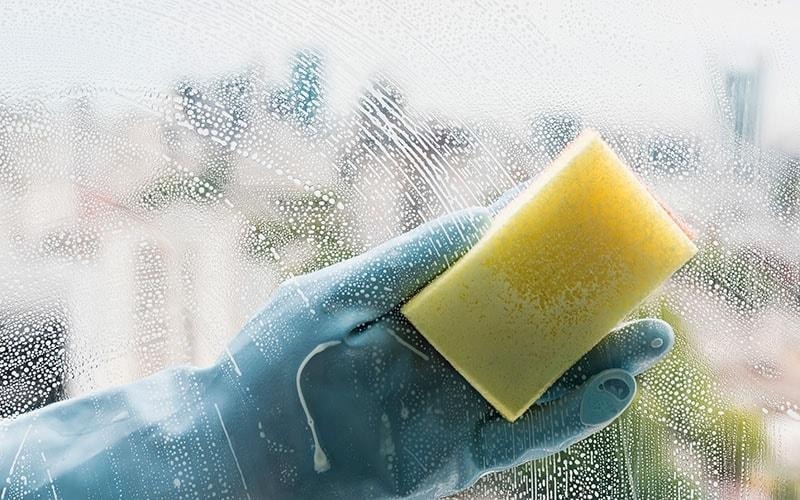
Level 4 is for 6+ months of stain and grime buildup. These are hard-to-clean stains that need some chemical intervention.
Materials Needed
- Glass Cleaner (Lysol, Bar Keepers Friend, etc.)
- Cleaning Sponge
- Microfiber Towel
- Spray Bottle (Optional)
Cleaning Steps
- Evenly spray the cleaner on the glass surface.
- Let it sit for a minute or two before you start scrubbing.
- Use a sponge to thoroughly scrub the shower doors.
- Rinse with water and wipe with a dry microfiber cloth.
All commercial cleaners contain an acidic base. Read the ingredients list to avoid harsh chemicals and vinegar-based solutions. Alternatively, you can mix 1 cup distilled water, 1 cup lemon juice (or warm vinegar), and a tablespoon of dish soap to make a homemade glass cleaner.
Level 5: Scraping with a Metal Blade
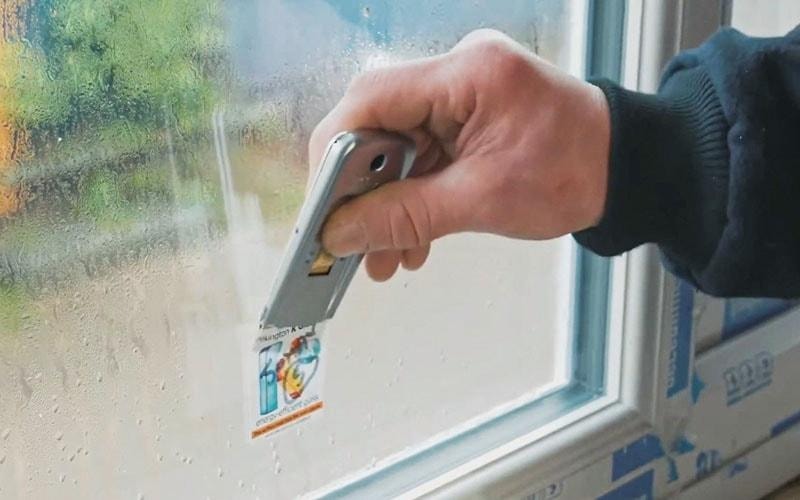
Level 5 is your last resort. Use it for glass shower doors with more than a year of grime buildup.
Materials Needed
- Sharp Metal Blade
- Glass Cleaner
- Sponge
- Microfiber Towel
You can easily find razor blade scrapers that are used for cleaning mirrors, microwave doors, and car windows.
Cleaning Steps
- Spray the shower door with water, then carefully scrape the grime with a razor blade. This is the best way to remove hard water stains.
- Rinse with lots of water and then scrub with your glass cleaner.
- Rinse again and examine the glass door for spots you may have missed.
- Finally, dry your glass shower doors with a clean microfiber cloth.
Razor blades can scratch glass if not used properly. Hence, we call this a last resort. Flat blades won’t work on textured glass. So, you can use a “0000 Grade” super-fine steel wool to scrub the glass.
Conclusion
Vinegar is an effective cleaning tool. But only because it’s an easy-to-find acid. Luckily, there are several other acid alternatives that you can use. Lemon juice is just as effective as vinegar and has a nice, refreshing scent. Use the different cleaning techniques from this guide for a vinegar-free cleaning experience.
Get High-Quality Microfiber Towels and Sponges from Manywell!
Manywell is the premier cleaning supplies manufacturer. We specialize in microfiber cloths, sponges, and dry mops. Use our high-performance microfiber towels to try your shower doors. All our products are 100% customizable. So you can optimize your cleaning routine.
Say goodbye to water streaks and hello to clean glass. Contact us now!

